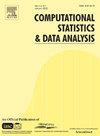A deflation-adjusted Bayesian information criterion for selecting the number of clusters in K-means clustering
IF 1.6
3区 数学
Q3 COMPUTER SCIENCE, INTERDISCIPLINARY APPLICATIONS
引用次数: 0
Abstract
A deflation-adjusted Bayesian information criterion is proposed by introducing a closed-form adjustment to the variance estimate after K-means clustering. An expected lower bound of the deflation in the variance estimate after K-means clustering is derived and used as an adjustment factor for the variance estimates. The deflation-adjusted variance estimates are applied to the Bayesian information criterion under the Gaussian model for selecting the number of clusters. The closed-form expression makes the proposed deflation-adjusted Bayesian information criterion computationally efficient. Simulation studies show that the deflation-adjusted Bayesian information criterion performs better than other existing clustering methods in some situations, including K-means clustering with the number of clusters selected by standard Bayesian information criteria, the gap statistic, the average silhouette score, the prediction strength, and clustering using a Gaussian mixture model with the Bayesian information criterion. The proposed method is illustrated through a real data application for clustering human genomic data from the 1000 Genomes Project.
在k均值聚类中选择聚类数量的一种经通货紧缩调整的贝叶斯信息准则
通过对k均值聚类后的方差估计引入封闭式调整,提出了一种通货紧缩调整的贝叶斯信息准则。推导了k均值聚类后方差估计中通货紧缩的期望下界,并将其用作方差估计的调整因子。将通货紧缩调整方差估计应用于高斯模型下的贝叶斯信息准则来选择聚类数量。封闭形式的表达式使所提出的通货紧缩调整贝叶斯信息准则的计算效率提高。仿真研究表明,在某些情况下,经紧缩调整的贝叶斯信息准则的聚类性能优于现有的其他聚类方法,包括使用标准贝叶斯信息准则选择聚类数量的K-means聚类、缺口统计量、平均轮廓分数、预测强度,以及使用高斯混合模型与贝叶斯信息准则聚类。通过对千人基因组计划中人类基因组数据聚类的实际应用,说明了该方法的有效性。
本文章由计算机程序翻译,如有差异,请以英文原文为准。
求助全文
约1分钟内获得全文
求助全文
来源期刊

Computational Statistics & Data Analysis
数学-计算机:跨学科应用
CiteScore
3.70
自引率
5.60%
发文量
167
审稿时长
60 days
期刊介绍:
Computational Statistics and Data Analysis (CSDA), an Official Publication of the network Computational and Methodological Statistics (CMStatistics) and of the International Association for Statistical Computing (IASC), is an international journal dedicated to the dissemination of methodological research and applications in the areas of computational statistics and data analysis. The journal consists of four refereed sections which are divided into the following subject areas:
I) Computational Statistics - Manuscripts dealing with: 1) the explicit impact of computers on statistical methodology (e.g., Bayesian computing, bioinformatics,computer graphics, computer intensive inferential methods, data exploration, data mining, expert systems, heuristics, knowledge based systems, machine learning, neural networks, numerical and optimization methods, parallel computing, statistical databases, statistical systems), and 2) the development, evaluation and validation of statistical software and algorithms. Software and algorithms can be submitted with manuscripts and will be stored together with the online article.
II) Statistical Methodology for Data Analysis - Manuscripts dealing with novel and original data analytical strategies and methodologies applied in biostatistics (design and analytic methods for clinical trials, epidemiological studies, statistical genetics, or genetic/environmental interactions), chemometrics, classification, data exploration, density estimation, design of experiments, environmetrics, education, image analysis, marketing, model free data exploration, pattern recognition, psychometrics, statistical physics, image processing, robust procedures.
[...]
III) Special Applications - [...]
IV) Annals of Statistical Data Science [...]
 求助内容:
求助内容: 应助结果提醒方式:
应助结果提醒方式:


